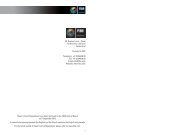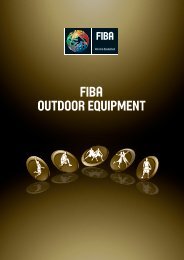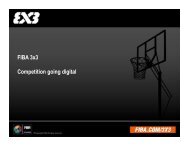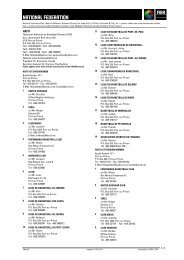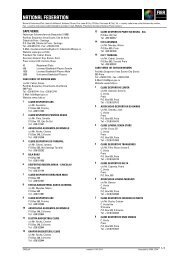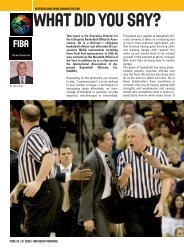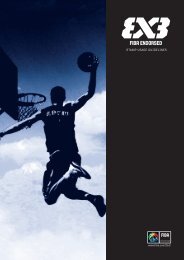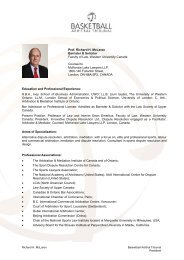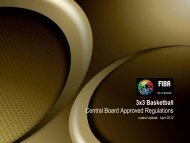FIBA General Statutes 2006
FIBA General Statutes 2006
FIBA General Statutes 2006
You also want an ePaper? Increase the reach of your titles
YUMPU automatically turns print PDFs into web optimized ePapers that Google loves.
<strong>FIBA</strong> Study Centre Approval Programmes- Basketballs<br />
The <strong>FIBA</strong> Study Centre Department has been appointed by the International<br />
Basketball Federation (<strong>FIBA</strong>) to run a Basketball Approval Programme on its<br />
behalf.<br />
The programme shall cover the period beginning on 1st January 2011 and<br />
expiring on 31st December 2014.<br />
Applicants are given an opportunity to submit their Basketballs for approval<br />
according to a programme established between <strong>FIBA</strong> and the TÜV Product<br />
Service GmbH in Munich, which is one of the most experienced and reputable<br />
test institutes in Europe.<br />
If the models are in accordance with the latest Official Basketball Rules &<br />
Basketball Equipment and if the test result is positive, the applicant is<br />
awarded an official Certificate of Approval issued by <strong>FIBA</strong>.<br />
Furthermore, the applicant receives an access to the artwork of the <strong>FIBA</strong> logo<br />
in the applicable reference to be put on the basketball.<br />
1. "How to obtain <strong>FIBA</strong> Approval":<br />
1.1 Send to the <strong>FIBA</strong> Research & Study Centre two (2) samples of the ball to<br />
be approved, the questionnaire, a written request including the name,<br />
the material, the serial number and the manufacturing facility of your<br />
basketball to be approved and all relevant technical literature* and<br />
documentation to:<br />
© <strong>FIBA</strong> – 2011 Edition Page 1/13
<strong>FIBA</strong> Study Centre Approval Programmes- Basketballs<br />
<strong>FIBA</strong> Fédération Internationale de Basketball<br />
Research and Study Centre Department<br />
53, Av. Louis-Casaï<br />
1216 Cointrin/Geneva,<br />
Switzerland<br />
Tél: +41 22 545 00 00<br />
Fax: +41 22 545 00 99<br />
Email: studycentre@fiba.com<br />
* The technical information should comprise brochures, commercial<br />
leaflets and technical specifications.<br />
1.2 The applicant forwards the required samples (see Par. 4) of each<br />
basketball for which approval is being requested to the Testing Institute<br />
appointed by <strong>FIBA</strong>. The testing programme comprises a series of<br />
different tests (as determined by the requirements contained in this<br />
document and any other which the Test Institute may deem suitable). It<br />
is likely to be somewhat time-consuming (minimum of 6 weeks).<br />
1.3 All tests performed are at the expense of the applicant.<br />
2.<br />
2.1<br />
"Tests successful":<br />
The <strong>FIBA</strong> Research & Study Centre receives the appropriate model in<br />
accordance with the latest Official Basketball Rules and Basketball<br />
Equipment.<br />
2.2 The <strong>FIBA</strong> Research & Study Centre receives the appropriate Test<br />
results as issued by the TÜV Product Service GmbH.<br />
© <strong>FIBA</strong> – 2011 Edition Page 2/13
<strong>FIBA</strong> Study Centre Approval Programmes- Basketballs<br />
2.3 The <strong>FIBA</strong> Research & Study Centre reserves the right to send a<br />
representative to visit the manufacturing plant.<br />
2.4 The <strong>FIBA</strong> Research & Study Centre sends two (2) original Agreements<br />
to be checked. The applicant returns the two (2) signed copies to the<br />
<strong>FIBA</strong> Research & Study Centre and settles the licence fee.<br />
2.5 Upon receipt of payment, the Certificate of Approval and the Licence to<br />
use the logo are awarded.<br />
2.6 The basketballs should be entitled to bear the appropriate <strong>FIBA</strong> logo.<br />
This artwork will be provided and the <strong>FIBA</strong> Study Centre will ensure that<br />
the logo is used in its correct dimension.<br />
The size of the logo should be 4 - 5 cm wide and 9-10 cm high or the<br />
opposite, depending on whether you use the vertical version or the<br />
horizontal version. Nevertheless the size of the “<strong>FIBA</strong> Approved” logo<br />
may depend on the size of the applicant’s logo.<br />
3. "<strong>FIBA</strong> has established two categories of basketballs as follows":<br />
3.1 "First Category - Category 1”:<br />
Basketballs used for the major <strong>FIBA</strong> competitions.<br />
Only leather, synthetic or composite leather size 7A (men), size 6A<br />
(women) and size 5A (minis) basketballs can apply for the <strong>FIBA</strong> license<br />
in this category. Applicants will be authorised to use the given <strong>FIBA</strong><br />
logo on the basketballs approved in this category.<br />
Basketballs being submitted in this category must be marked with:<br />
1. The name or logo of the producer<br />
2. The name of the company requesting approval<br />
3. The type indication<br />
4. The serial number<br />
© <strong>FIBA</strong> – 2011 Edition Page 3/13
<strong>FIBA</strong> Study Centre Approval Programmes- Basketballs<br />
The total fee for the licence is CHF 14’000 for men/ year, CHF 9’500 for<br />
women/ year and CHF 6’500 for minis/ year. Value added tax will be<br />
added in accordance with the laws of Switzerland.<br />
3.2 "Second Category – Category 2”:<br />
Basketballs used in other competitions.<br />
Only rubber size 7B (men), rubber size 6B (women) basketballs and size<br />
5A (minis) basketballs can apply for the <strong>FIBA</strong> license in this category.<br />
Applicants will be authorised to use the given <strong>FIBA</strong> logo on the<br />
basketballs approved in this category.<br />
Basketballs being submitted in this category must be marked with:<br />
1. The name or logo of the producer<br />
2. The name of the company requesting approval<br />
3. The type indication<br />
The total fee for the licence is CHF 8’500 for men/year, CHF 5’500 for<br />
women/ year and CHF 5’000 for minis/year. Value added tax will be<br />
added in accordance with the laws of Switzerland.<br />
4. "Required samples of basketballs for the testing procedure":<br />
The applicant will supply the TÜV Product Service GmbH at its following<br />
address free of charges, fees, taxes, customs, etc.:<br />
Eight (8) samples of leather, synthetic or composite leather size 7A<br />
basketballs for Category 1 approvals.<br />
Six (6) samples of leather, synthetic or composite leather size 6A<br />
basketballs for Category 1 approvals.<br />
Six (6) samples of leather, synthetic or composite leather size 5A<br />
basketballs for Category 1 approvals.<br />
and/or<br />
© <strong>FIBA</strong> – 2011 Edition Page 4/13
<strong>FIBA</strong> Study Centre Approval Programmes- Basketballs<br />
Five (5) samples of rubber size 7B basketballs for the Category 2<br />
approvals.<br />
Four (4) samples of rubber size 6B basketballs for the Category 2<br />
approvals.<br />
Four (4) samples of rubber size 5B basketballs for the Category 2<br />
approvals.<br />
Address: TÜV Product Service GmbH<br />
Attn.: Mr. Volker Kron<br />
Ridlerstr. 65<br />
80339 München<br />
Germany<br />
NB: Two (2) balls must be sent to <strong>FIBA</strong> offices for model inspection.<br />
Also, upon request, two (2) additional balls must be supplied each year<br />
for a random control test at the expenses of the applicant.<br />
5. "Test Fees":<br />
The applicant shall make the following payment to <strong>FIBA</strong>:<br />
CHF 3’000 non-reimbursable test fee for Category 7A (1) basketballs<br />
CHF 2’500 non-reimbursable test fee for Category 6A (1) basketballs<br />
CHF 2’000 non-reimbursable test fee for Category 5A (1) basketballs<br />
CHF 2’000 non-reimbursable test fee for Category 7B (2) basketballs<br />
CHF 1’700 non-reimbursable test fee for category 6B (2) basketballs<br />
CHF 1’700 non-reimbursable test fee for category 5B (2) basketballs<br />
In addition to the test fee the applicant agrees to pay the applicable<br />
value added tax.<br />
© <strong>FIBA</strong> – 2011 Edition Page 5/13
6.<br />
"Test":<br />
<strong>FIBA</strong> Study Centre Approval Programmes- Basketballs<br />
6.1 If the quality test is successful and the model is in accordance with the<br />
<strong>FIBA</strong> rules, the <strong>FIBA</strong> Study Centre will issue to the applicant an invoice<br />
for the license fee for Category 7A, 6A and 5A (1) or for Category 7B, 6B<br />
and 5B(2) as listed at Par. 3.<br />
6.2 As soon as the license fee has been received, the <strong>FIBA</strong> Study Centre<br />
will issue to the applicant a certificate approving the ball tested for use<br />
in the category of the competitions for which approval is requested. The<br />
certificate will also grant to the applicant a license to use the <strong>FIBA</strong> logo<br />
on the balls of the type tested in the form and only in the form<br />
authorised by <strong>FIBA</strong> (the artwork will be made available to the<br />
applicant).(Exact size determined in clause 2.6)<br />
6.3 If the test is unsuccessful, the <strong>FIBA</strong> Study Centre will inform the<br />
applicant accordingly and will specify which part of the test has been<br />
unsuccessful. The applicant may apply for a re-testing of the ball,<br />
provided that a further<br />
- set of eight* basketballs (Category 7A, 6A and 5A (1)) and/or a further<br />
- set of five* basketballs (Category 7B, 6B and 5B (2)) is supplied to the<br />
<strong>FIBA</strong> Study Centre and a further<br />
* the number of balls to be provided may be less depending on which test was failed.<br />
- fee of CHF 1’700* for the re-testing of Category 7A (1) balls and /or<br />
- fee of CHF 1’300* for the re-testing of Category 6A (1) balls and /or<br />
- fee of CHF 1’000* for the re-testing of Category 5A (1) balls and<br />
© <strong>FIBA</strong> – 2011 Edition Page 6/13
a further<br />
<strong>FIBA</strong> Study Centre Approval Programmes- Basketballs<br />
- fee of CHF 1’100* for the re-testing of Category 7B (2) balls is paid/or<br />
- fee of CHF 900* for the re-testing of Category 6B (2) balls is paid/ or<br />
- fee of CHF 900* for the re-testing of Category 5 B (2) balls is paid<br />
to the <strong>FIBA</strong> Study Centre.<br />
* the fees may vary according to the re-testing. Mainly failed parameters are retested.<br />
Under no circumstances will the test fee paid by the applicant under<br />
this Agreement be reimbursed if the test is unsuccessful.<br />
6.4 "Identical Balls":<br />
A separate test and licence may not be required but a separate<br />
certificate must be requested for a ball which is identical in<br />
construction and material with a ball already approved, but is marketed<br />
under a different name or label.<br />
In each such case the applicant must:<br />
a. submit to the <strong>FIBA</strong> Study Centre one sample of the identical ball for<br />
random testing so as to identify with the ball for which approval has<br />
been granted, and<br />
b. pay an additional administration fee of CHF 600 VAT.<br />
6.5 "Minor changes":<br />
The approval and the licence granted according to Par. 6.2 above are<br />
exclusively for the type of basketball tested and only for basketballs of<br />
that type if manufactured in the factories specified in the request.<br />
In the event that the applicant makes minor changes to the balls or<br />
moves the production to a different manufacturing facility, a full test<br />
and a new license may not be necessary.<br />
© <strong>FIBA</strong> – 2011 Edition Page 7/13
<strong>FIBA</strong> Study Centre Approval Programmes- Basketballs<br />
In order for the <strong>FIBA</strong> Study Centre to make a decision to that effect, the<br />
applicant shall specify to the <strong>FIBA</strong> Research & Study Centre precisely<br />
the changes made and/or the new location where the basketballs are<br />
manufactured.<br />
After consultation with the test institute, the <strong>FIBA</strong> Study Centre will<br />
advise the applicant whether a full test and a new license will be<br />
necessary or whether a reduced test at a reduced rate and a reduced<br />
license fee may be sufficient.<br />
An approval and a licence will only be given after:<br />
- the reduced test fee has been paid,<br />
- the test has been successful,<br />
- the reduced licence fee has been paid and<br />
- the certificate has been issued.<br />
7. "Term of approval / licence":<br />
The approval and the licence are for the period beginning on 1st<br />
January, 2011 and ending on 31st December, 2014.<br />
The <strong>FIBA</strong> Research & Study Centre reserves the right to withdraw the<br />
approval and the licence if during a random re-test a ball of the type<br />
already tested (as available on the market) does not pass the test<br />
outlined in exhibit 1.<br />
The <strong>FIBA</strong> Research & Study Centre further reserves the right to<br />
withdraw the approval and the licence if the applicant makes use of the<br />
logo in a manner contrary to the terms of this Agreement.<br />
© <strong>FIBA</strong> – 2011 Edition Page 8/13
8. "Applicable law / venue":<br />
1<br />
<strong>FIBA</strong> Study Centre Approval Programmes- Basketballs<br />
The Agreement is subject to the laws of Switzerland.<br />
The courts of Geneva, Switzerland shall have exclusive jurisdiction.<br />
Exhibit 1<br />
Purpose<br />
The test programme is designed to establish requirements and<br />
repeatable tests for the qualifying of basketballs in two categories,<br />
namely Category 7A, 6A and 5A(Category 1), and Category 7B, 6B and<br />
5B (Category 2). The requirements for the two categories vary in kind<br />
and number of the tests.<br />
2 Field of Application of Test Rules<br />
This test programme is valid for all basketballs for which a <strong>FIBA</strong> licence<br />
is requested. The tests are based on the <strong>FIBA</strong> Official Basketball Rules.<br />
3 Conditions of the Test<br />
The test will be performed as a type test at standard atmosphere<br />
(Atmospheric temperature 23°C, relative air humidity 50%, atmospheric<br />
pressure 860 to 1060 millibar). All measuring devices must be capable of<br />
measuring with a tolerance of no more than /-2%.<br />
4 Test Samples<br />
The test will be performed:<br />
- with 8 basketballs for the <strong>FIBA</strong>-licence Category 7A<br />
- with 6 basketballs for the <strong>FIBA</strong>-licence Category 6A<br />
- with 6 basketballs for the <strong>FIBA</strong>-licence Category 5A<br />
© <strong>FIBA</strong> – 2011 Edition Page 9/13
<strong>FIBA</strong> Study Centre Approval Programmes- Basketballs<br />
- with 5 basketballs for the <strong>FIBA</strong>-licence Category 7B<br />
- with 4 basketballs for the <strong>FIBA</strong>-licence Category 6B<br />
-with 4 basketballs for the <strong>FIBA</strong>-licence Category 5B<br />
Ball material requirement:<br />
The material of a Category 1, 7A, basketball shall be genuine leather or<br />
artificial/synthetic leather or composite leather with the same or better<br />
performance than leather.<br />
5 Rebound Height and Reflection of the Basketball, respectively<br />
The internal pressure of the balls will be increased until the rebound<br />
height from a drop height of 1800 mm is at least 1300 mm /-100mm<br />
(reference pressure). The test is performed on a plane surface with a<br />
mass of more than 1 ton. The rebound height has to be measured with<br />
appropriate testing equipment and has to be registered.<br />
6 Ball Geometry<br />
Circumference and geometrical accuracy of all testing samples are<br />
measured at reference pressure. Circumference shall be not less than<br />
749 mm and not more than 780 mm.<br />
7 Weight of the Basketball<br />
The mass of the ball that is ready for play will be determined in all test<br />
samples.<br />
It must be between 567 g and 650 g.<br />
© <strong>FIBA</strong> – 2011 Edition Page 10/13
<strong>FIBA</strong> Study Centre Approval Programmes- Basketballs<br />
8 Fatigue Strength<br />
The test is performed with a ball-shooting machine with one ball. At the<br />
beginning of the fatigue test, the ball has to be inflated to reference<br />
pressure. It must not be re-inflated either during or after the fatigue<br />
test. The ball that is used for the test will be bounced 20,000 times. The<br />
energy of each bounce must correspond to a free fall from a height of<br />
1800 mm. After the fatigue test, the tests in accordance with Par. 5 and<br />
6 will be repeated. A leak test has to be carried out before and after the<br />
fatigue test.<br />
9 Surface material requirement<br />
The surface of the basketball shall be free of toxic materials and<br />
materials which may cause an allergic reaction. The manufacturer of<br />
the balls must provide a list of the used materials and colours. The balls<br />
must be free of heavy metals (EN 71) and AZO colours. This requirement<br />
has to be met for both Category 1 and Category 2 basketballs.<br />
10 Heat-storage test<br />
This test is only performed on Category 1 (7A , 6A and 5A) basketballs.<br />
Two balls at reference pressure will be stored for 7 days at a<br />
temperature of 70°C.<br />
Afterwards there must be no noticeable exterior change, defect of the<br />
valve or the seams. Afterwards the ball geometry will be measured<br />
again at reference pressure (Par. 6 above).<br />
11 Valve test (leak test)<br />
Before and after the heat-storage test according to Par. 10, a dry<br />
© <strong>FIBA</strong> – 2011 Edition Page 11/13
<strong>FIBA</strong> Study Centre Approval Programmes- Basketballs<br />
needle for inflating will be inserted into the valve 100 times. After this<br />
procedure, leakage should not occur.<br />
12 Practice Test (Grip requirement)<br />
The basketball surface shall provide a proper grip over the entire ball<br />
(pole of the ball, brand name and all other areas). The grip shall be<br />
tested with the following test apparatus with 5 test persons.<br />
Place the ball in different positions on the flat of the test person’s hand.<br />
The hand of the test person shall be supported by a table. Pull the fixed<br />
ball, loaded with 50N at a constant speed of 80-100 mm/s in a finger<br />
direction from the hand and measure the force. The test must be<br />
performed 3 times on 3 different positions of the ball. Calculate the<br />
average value. Proceed in the same manner with each test person.<br />
Calculate the average friction factor based on the average values of the<br />
5 test persons. The final friction factor must be a minimum of 04. As an<br />
alternative to the lab test, a test game is possible.<br />
13 Quality Assurance<br />
The manufacturer has to deliver the declaration required by <strong>FIBA</strong><br />
referring to constant production quality and has to confirm that the<br />
balls presented for testing have been taken from a serial production.<br />
14 Control Test<br />
This test is only applicable for Category 1 (7A, 6A and 5A) basketballs.<br />
Each year, during the validity of the licence, two samples from the<br />
series may be submitted for a simplified control test according to Par. 5<br />
to Par. 7 of the testing programme.<br />
© <strong>FIBA</strong> – 2011 Edition Page 12/13
<strong>FIBA</strong> Study Centre Approval Programmes- Basketballs<br />
15 Marking<br />
Each ball has to be marked with the name or logo of the manufacturer<br />
as well as with the indication of the type. Moreover, balls endorsed with<br />
the <strong>FIBA</strong>-licence Category 1 must be marked with a serial number.<br />
16 Certification<br />
After having passed the test, <strong>FIBA</strong> extends for each tested ball-type a<br />
certificate, which contains the following specifications (see also page<br />
2):<br />
Category 7A , 6A and 5A (1) or 7B, 6B and 5B (2)<br />
Type of Basketball (Model)<br />
Material of the Basketball<br />
Serial Number (only Category 1; 7A, 6A and 5A)<br />
Validity of Licence<br />
© <strong>FIBA</strong> – 2011 Edition Page 13/13



